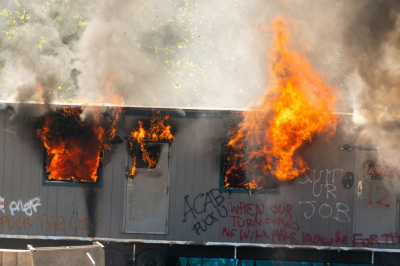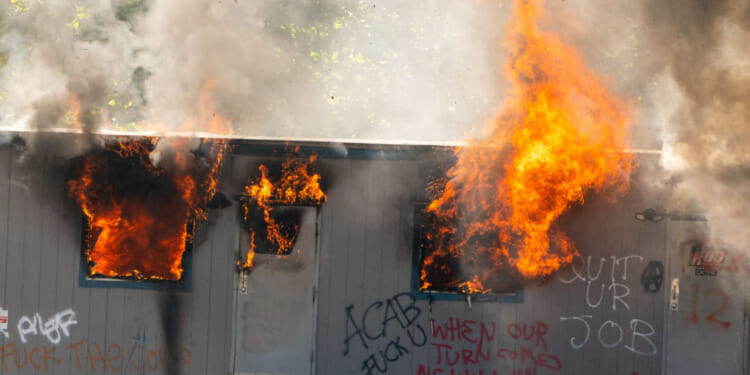
Something has shifted in American political culture, and we must not look away from it.
A recent survey from the Skeptic Research Center reveals that 49% of Gen Z liberals agree that “violence is often necessary to create social change.”
Read that again. Nearly half. This is not fringe thinking — this is the mainstream of an entire generation on the left.
And it explains what we’re now witnessing — a growing series of murders, death threats, doxxing, assaults, and other forms of political violence against conservative influencers, Christian schoolchildren, corporate executives, federal judges, and law enforcement officers.
These are not isolated incidents. They form a pattern. And the pattern raises questions a healthy republic should never have to ask: Has political violence become morally acceptable to a significant portion of the American Left? When does rhetoric turn lethal? And what does Scripture require of the Church in such a moment?
The evidence mounts
The pattern began emerging years ago. After the Dobbs v. Jackson decision that overturned Roe v. Wade in 2022, a man armed with a gun, knife, and various tools was arrested outside Justice Brett Kavanaugh’s home. He was charged with attempting to murder a Supreme Court justice, pleaded guilty, and has now been sentenced to just eight years.
That same year, Jay Jones — now the Democrat nominee for Virginia Attorney General — sent text messages fantasizing about murdering the Republican Speaker of Virginia’s House of Delegates. The texts only came to light recently, during his 2025 campaign. In them, Jones was given a hypothetical choice between shooting Adolf Hitler, Pol Pot, or Speaker Todd Gilbert. He wrote: “Gilbert gets two bullets to the head.” When these messages surfaced with early voting already underway, top Democrats declined to call for his withdrawal.
The violence intensified. Donald Trump survived two separate assassination attempts during the 2024 presidential campaign. In both cases, armed individuals positioned themselves to kill the Republican nominee.
In December 2024, Luigi Mangione allegedly murdered UnitedHealthcare CEO Brian Thompson in Manhattan. The response: Mangione became an instant “folk hero” among the left. More than 74,000 people reacted with “laughing” emojis to UnitedHealthcare’s Facebook condolence post. Merchandise featuring Mangione’s image sold online. Defense funds swelled. Women posted “thirst tweets” swooning over his appearance. CNN displayed his shirtless photos during news coverage. All of this — for a man accused of shooting an unarmed man in the back on a city street.
By 2025, the violence has accelerated further. A trans shooter walked into Annunciation Catholic Church in Minneapolis and opened fire during a weekday morning service, killing two children and wounding 21 others. The targets were worshipers.
Less than two weeks later, Charlie Kirk was assassinated in broad daylight while addressing a crowd of students at Utah Valley University. Social media erupted with thousands of posts on Bluesky, Tik Tok, and other platforms celebrating and mocking his murder.
Federal law enforcement is also facing brash and unprecedented attacks. The Department of Homeland Security (DHS) reports a more than 1,000% increase in assaults against ICE agents attempting to enforce immigration law. This includes two different ambush shooting attacks on ICE facilities that injured an ICE officer and killed one ICE detainee and critically injured another.
And it’s not just random violence. A DHS review of DEA intelligence revealed that gangs in southwest Chicago neighborhoods, were offered cash bounties to assassinate federal officers. According to the Washington Examiner, these cartels tracked law enforcement movements using rooftop spotters and encrypted radio chatter.
The payments were explicit: $5,000 for an agent, $25,000 for a commanding officer, and up to $50,000 for a high-ranking official. Organized crime now places a literal price tag on those enforcing federal law.
The ideology behind the violence
Why is violence becoming so acceptable to the left? The answer is both theological and ideological.
At its root, the left has embraced a quasi-gnostic worldview that divides humanity into the enlightened and the unenlightened, the oppressors and the oppressed. In this framework, those who stand in the way of “social change” — whether it be unrestricted abortion, gender ideology, open borders, or any number of sacred progressive causes — are not simply wrong, they are evil. They are viewed as “fascists,” “Nazis,” “deplorables.” And what do you do with vile people? You certainly don’t debate them. You stop them — by any means necessary.
This rhetoric is commonplace. It flows from politicians, media commentators, and activists who have spent years dehumanizing their opponents. When the Church that preaches traditional sexual morality becomes a legitimate target, when the conservative activist who challenges gender ideology becomes expendable, when the immigration officer becomes a Gestapo agent — these are not random acts of madness. They are the logical conclusions of an ideology that has sacralized certain political positions and demonized all dissent.
This is the natural fruit of a worldview disconnected from the authority of Scripture. When man becomes the measure of all things, when personal autonomy and self-defined justice replace God’s law, violence becomes not only permissible but virtuous. The revolutionary always believes his cause justifies his methods.
The Apostle Paul warned us of such men: “Their end is destruction, their god is their belly, and they glory in their shame, with minds set on earthly things” (Philippians 3:19).
History confirms this pattern. The French Revolution promised liberty, equality, and fraternity — and delivered the guillotine. The Bolsheviks promised liberation from oppression — and delivered the Gulag.
When transcendent moral authority is rejected, utopian ideology fills the void. And utopian ideology always, always leads to bloodshed. Those who believe they are building heaven on earth inevitably create hell for those who stand in their way.
Where this road leads
We have seen this before. Weimar Germany descended into political violence as competing ideologies — each convinced of its own righteousness — turned streets into battlegrounds. The result was not resolution but the rise of totalitarianism.
When political violence becomes normalized, when opponents are consistently dehumanized, when assassination is celebrated rather than condemned, society does not course correct. It accelerates toward collapse.
The question is not whether this can happen in America. The question is whether we are already on that path.
The silence of complicity
What may be most troubling is not the violent rhetoric itself but the response from Democratic leadership.
When Jay Jones’s texts came to light, Virginia Sen. Tim Kaine called them “beyond the pale” but affirmed his continued support. Democrat Virginia gubernatorial candidate Abigail Spanberger condemned the tweets but refused to ask Jones to step aside, insisting that voters should make the decision. Sean Rankin, president of the Democratic Attorneys General Association, characterized the texts as “reckless and unacceptable” but concluded that Jones was still the better choice. The Democratic National Committee declined to comment.
This is not a party drawing a hard line against political violence. This is a party calculating the electoral cost of condemning it.
Virginia Democratic Party Chairman Lamont Bagby made the calculation explicit: “There’s no way [Republicans] can take the moral high ground when they have Donald Trump sitting in the Oval Office. Jay Jones will be our candidate, and he will win.”
The message is clear: Our side’s violence is regrettable but ultimately excusable.
The Christian response
So, what is the faithful response to this moment?
First, we must name what is happening. Political violence is evil. It is the fruit of hearts at war with God. Whether it comes from the right or the left, it must be condemned without equivocation.
The Sixth Commandment — “You shall not murder” — admits no exceptions. To fantasize about killing your political opponents violates the spirit of God’s law. To carry out such killings is to commit the gravest of sins against the image of God.
Second, we must reject false equivalence. When confronted with violence from their own ranks, leftist leaders point to Donald Trump. Christians must refuse to play this game.
We do not defend sin by pointing to the sins of others. As Scripture commands: “Do not be overcome by evil but overcome evil with good” (Romans 12:21).
Third, we must recognize the worldview at war. The left’s growing acceptance of political violence flows from a materialist, utopian vision that has no place for transcendent truth or the image of God in every person. This is a spiritual battle requiring spiritual weapons.
We must proclaim the Lordship of Christ over all of life, including politics. We must insist that human beings possess inherent dignity, not because of their utility to the revolution but because they are made in God’s image.
Fourth, we must remember the Church’s historic role. Throughout history, the Church has served as a restraining force against political violence. When Roman emperors demanded absolute loyalty, Christians proclaimed a higher King. When French revolutionaries worshiped the goddess of Reason, the faithful maintained that reason itself finds its source in God. When totalitarian regimes of the 20th century demanded idolatrous devotion and killed those Christians who refused, the Church — at its best — stood firm.
We are called to that same witness now. As Proverbs 24:11-12 commands: “Rescue those who are being taken away to death; hold back those who are stumbling to the slaughter.”
Finally, we must not lose heart. Christ has already won the victory. His Kingdom advances not through violence but through the proclamation of the Gospel and the faithful obedience of His people.
Our weapons are not carnal but mighty through God for the pulling down of strongholds (2 Corinthians 10:4-5). We demolish arguments and every pretension that sets itself up against the knowledge of God.
The questions before us
Will the American left recognize and repent of its growing tolerance for political violence? Will Democratic leadership condemn it clearly and consistently, even when politically inconvenient? Will a generation raised to see politics as warfare recognize that their opponents bear the image of God?
And most importantly: Will the Church be the Church — proclaiming the Lordship of Christ, defending the image of God in all people, and offering the only hope that can truly heal a nation bent on tearing itself apart?
The answer is not yet written. It depends, in part, on whether those who name the name of Christ will stand firm on the authority of God’s Word, refusing both the violence of the revolutionary and the cowardice of the compromiser.
The Left’s rhetoric has turned lethal. The data reveals a generation that increasingly views violence as viable. And the Church must decide whether it will speak truth to this moment — or remain silent in the face of bloodshed.
May God give us the courage to choose rightly.
Originally published at the Standing for Freedom Center.
Virgil L. Walker is the Executive Director of Operations for G3 Ministries, an author, and a conference speaker. He is the co-host of the Just Thinking Podcast. Virgil is passionate about teaching, disciple-making, and sharing the Gospel of Jesus Christ. Virgil and his wife Tomeka have been married for 26 years and have three children. Listen to his podcast here.

















